Reflective Essay on Religion, Spirituality, and Ethics - [Course Name]
VerifiedAdded on 2022/11/29
|7
|1512
|323
Essay
AI Summary
This reflective essay delves into the multifaceted realms of religion, spirituality, and ethics, providing a comprehensive analysis of diverse perspectives. The essay begins by contrasting the Christian perspective on spirituality and ethics with the tenets of postmodern relativism within healthcare, exploring their fundamental differences and implications. It then examines the concept of scientism, outlining its core principles and dissecting two prominent arguments leveled against its philosophical underpinnings. The core of the essay comprises a personal exploration of worldview, addressing fundamental questions such as the nature of ultimate reality, the universe, human beings, knowledge, ethical foundations, and the purpose of existence. The student articulates their unique perspectives on each of these profound questions, providing insights into their beliefs and values. The essay is thoroughly researched and adheres to APA formatting guidelines, demonstrating a strong understanding of the subject matter.
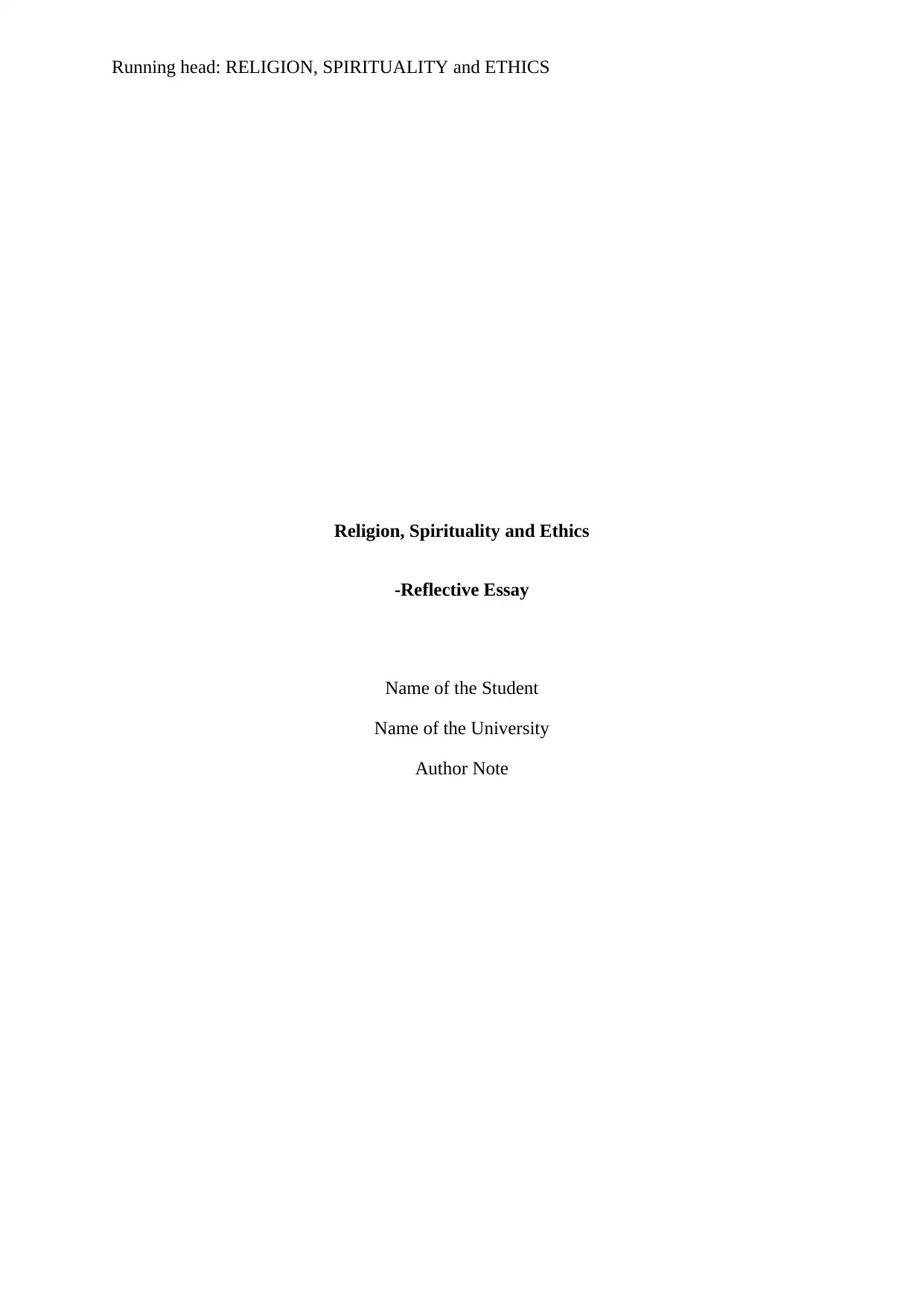
Running head: RELIGION, SPIRITUALITY and ETHICS
Religion, Spirituality and Ethics
-Reflective Essay
Name of the Student
Name of the University
Author Note
Religion, Spirituality and Ethics
-Reflective Essay
Name of the Student
Name of the University
Author Note
Paraphrase This Document
Need a fresh take? Get an instant paraphrase of this document with our AI Paraphraser
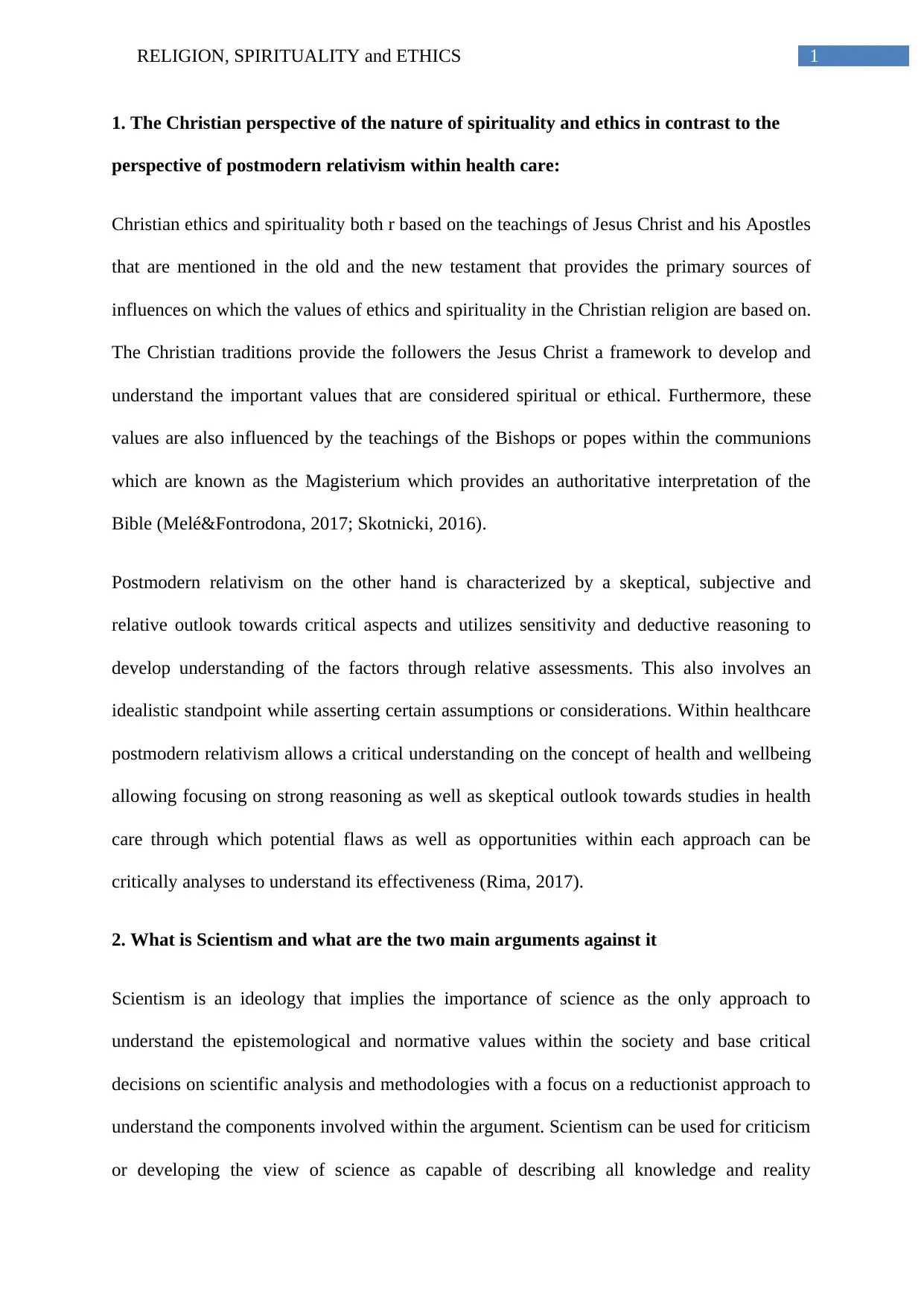
1RELIGION, SPIRITUALITY and ETHICS
1. The Christian perspective of the nature of spirituality and ethics in contrast to the
perspective of postmodern relativism within health care:
Christian ethics and spirituality both r based on the teachings of Jesus Christ and his Apostles
that are mentioned in the old and the new testament that provides the primary sources of
influences on which the values of ethics and spirituality in the Christian religion are based on.
The Christian traditions provide the followers the Jesus Christ a framework to develop and
understand the important values that are considered spiritual or ethical. Furthermore, these
values are also influenced by the teachings of the Bishops or popes within the communions
which are known as the Magisterium which provides an authoritative interpretation of the
Bible (Melé&Fontrodona, 2017; Skotnicki, 2016).
Postmodern relativism on the other hand is characterized by a skeptical, subjective and
relative outlook towards critical aspects and utilizes sensitivity and deductive reasoning to
develop understanding of the factors through relative assessments. This also involves an
idealistic standpoint while asserting certain assumptions or considerations. Within healthcare
postmodern relativism allows a critical understanding on the concept of health and wellbeing
allowing focusing on strong reasoning as well as skeptical outlook towards studies in health
care through which potential flaws as well as opportunities within each approach can be
critically analyses to understand its effectiveness (Rima, 2017).
2. What is Scientism and what are the two main arguments against it
Scientism is an ideology that implies the importance of science as the only approach to
understand the epistemological and normative values within the society and base critical
decisions on scientific analysis and methodologies with a focus on a reductionist approach to
understand the components involved within the argument. Scientism can be used for criticism
or developing the view of science as capable of describing all knowledge and reality
1. The Christian perspective of the nature of spirituality and ethics in contrast to the
perspective of postmodern relativism within health care:
Christian ethics and spirituality both r based on the teachings of Jesus Christ and his Apostles
that are mentioned in the old and the new testament that provides the primary sources of
influences on which the values of ethics and spirituality in the Christian religion are based on.
The Christian traditions provide the followers the Jesus Christ a framework to develop and
understand the important values that are considered spiritual or ethical. Furthermore, these
values are also influenced by the teachings of the Bishops or popes within the communions
which are known as the Magisterium which provides an authoritative interpretation of the
Bible (Melé&Fontrodona, 2017; Skotnicki, 2016).
Postmodern relativism on the other hand is characterized by a skeptical, subjective and
relative outlook towards critical aspects and utilizes sensitivity and deductive reasoning to
develop understanding of the factors through relative assessments. This also involves an
idealistic standpoint while asserting certain assumptions or considerations. Within healthcare
postmodern relativism allows a critical understanding on the concept of health and wellbeing
allowing focusing on strong reasoning as well as skeptical outlook towards studies in health
care through which potential flaws as well as opportunities within each approach can be
critically analyses to understand its effectiveness (Rima, 2017).
2. What is Scientism and what are the two main arguments against it
Scientism is an ideology that implies the importance of science as the only approach to
understand the epistemological and normative values within the society and base critical
decisions on scientific analysis and methodologies with a focus on a reductionist approach to
understand the components involved within the argument. Scientism can be used for criticism
or developing the view of science as capable of describing all knowledge and reality
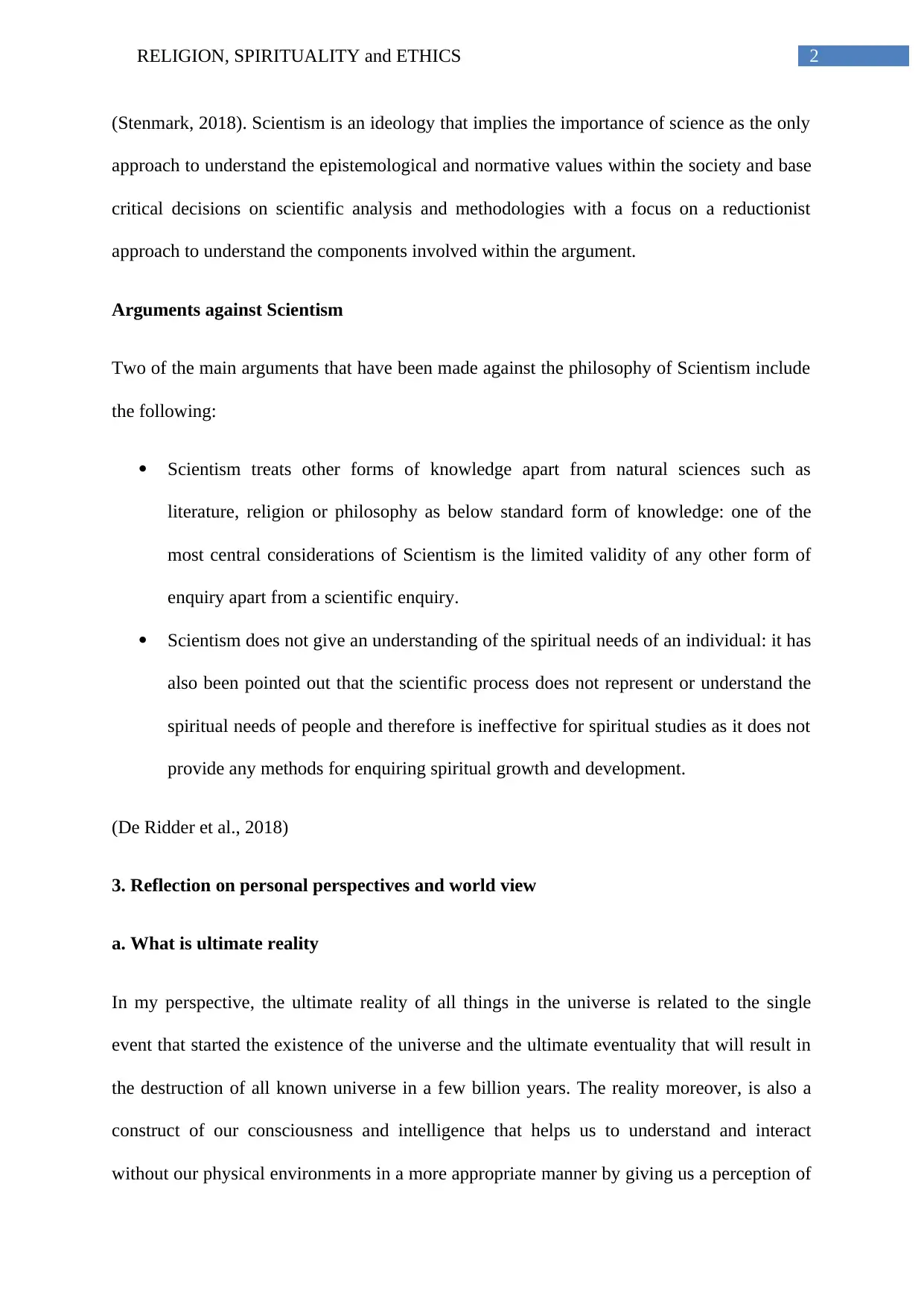
2RELIGION, SPIRITUALITY and ETHICS
(Stenmark, 2018). Scientism is an ideology that implies the importance of science as the only
approach to understand the epistemological and normative values within the society and base
critical decisions on scientific analysis and methodologies with a focus on a reductionist
approach to understand the components involved within the argument.
Arguments against Scientism
Two of the main arguments that have been made against the philosophy of Scientism include
the following:
Scientism treats other forms of knowledge apart from natural sciences such as
literature, religion or philosophy as below standard form of knowledge: one of the
most central considerations of Scientism is the limited validity of any other form of
enquiry apart from a scientific enquiry.
Scientism does not give an understanding of the spiritual needs of an individual: it has
also been pointed out that the scientific process does not represent or understand the
spiritual needs of people and therefore is ineffective for spiritual studies as it does not
provide any methods for enquiring spiritual growth and development.
(De Ridder et al., 2018)
3. Reflection on personal perspectives and world view
a. What is ultimate reality
In my perspective, the ultimate reality of all things in the universe is related to the single
event that started the existence of the universe and the ultimate eventuality that will result in
the destruction of all known universe in a few billion years. The reality moreover, is also a
construct of our consciousness and intelligence that helps us to understand and interact
without our physical environments in a more appropriate manner by giving us a perception of
(Stenmark, 2018). Scientism is an ideology that implies the importance of science as the only
approach to understand the epistemological and normative values within the society and base
critical decisions on scientific analysis and methodologies with a focus on a reductionist
approach to understand the components involved within the argument.
Arguments against Scientism
Two of the main arguments that have been made against the philosophy of Scientism include
the following:
Scientism treats other forms of knowledge apart from natural sciences such as
literature, religion or philosophy as below standard form of knowledge: one of the
most central considerations of Scientism is the limited validity of any other form of
enquiry apart from a scientific enquiry.
Scientism does not give an understanding of the spiritual needs of an individual: it has
also been pointed out that the scientific process does not represent or understand the
spiritual needs of people and therefore is ineffective for spiritual studies as it does not
provide any methods for enquiring spiritual growth and development.
(De Ridder et al., 2018)
3. Reflection on personal perspectives and world view
a. What is ultimate reality
In my perspective, the ultimate reality of all things in the universe is related to the single
event that started the existence of the universe and the ultimate eventuality that will result in
the destruction of all known universe in a few billion years. The reality moreover, is also a
construct of our consciousness and intelligence that helps us to understand and interact
without our physical environments in a more appropriate manner by giving us a perception of
⊘ This is a preview!⊘
Do you want full access?
Subscribe today to unlock all pages.

Trusted by 1+ million students worldwide
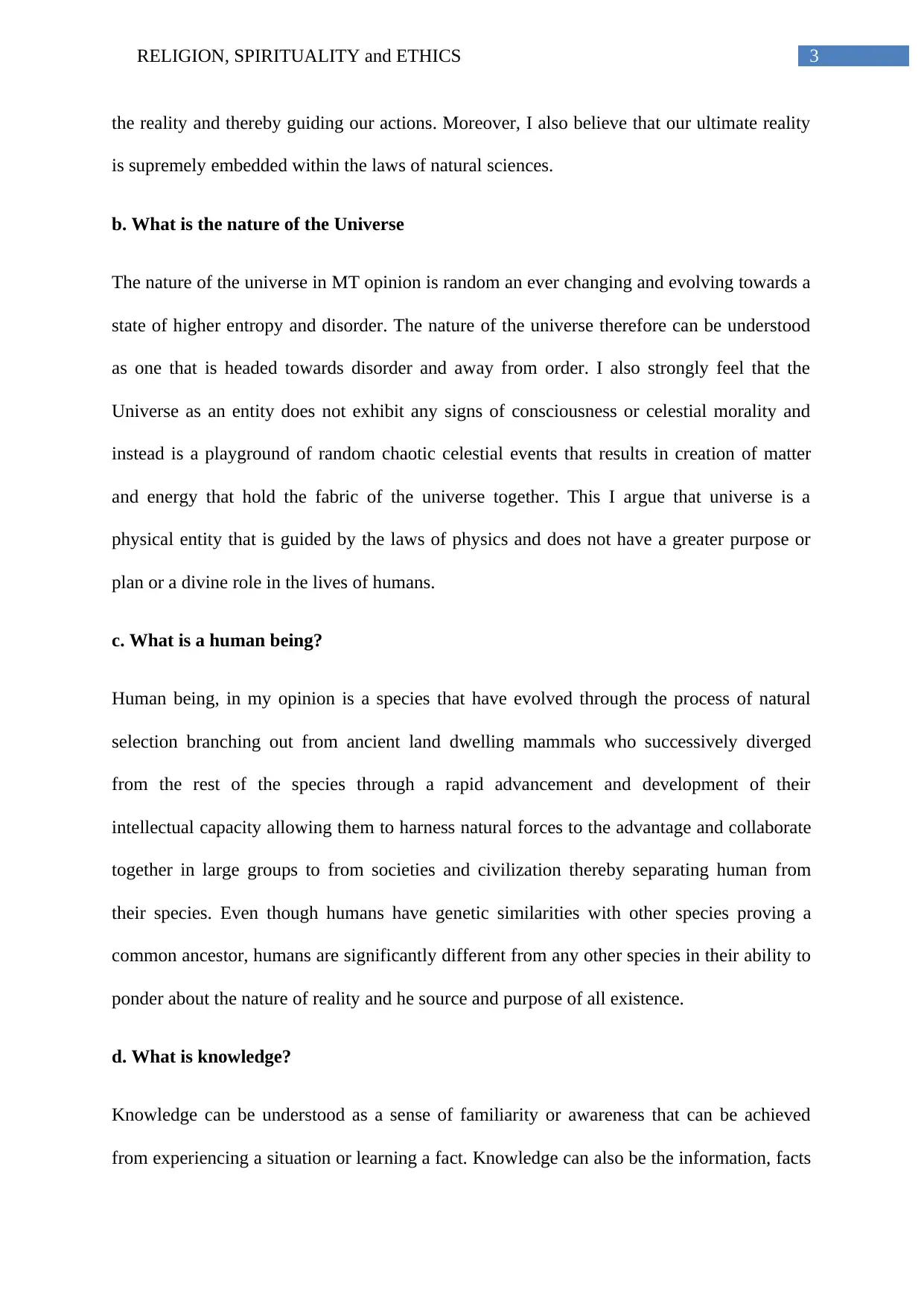
3RELIGION, SPIRITUALITY and ETHICS
the reality and thereby guiding our actions. Moreover, I also believe that our ultimate reality
is supremely embedded within the laws of natural sciences.
b. What is the nature of the Universe
The nature of the universe in MT opinion is random an ever changing and evolving towards a
state of higher entropy and disorder. The nature of the universe therefore can be understood
as one that is headed towards disorder and away from order. I also strongly feel that the
Universe as an entity does not exhibit any signs of consciousness or celestial morality and
instead is a playground of random chaotic celestial events that results in creation of matter
and energy that hold the fabric of the universe together. This I argue that universe is a
physical entity that is guided by the laws of physics and does not have a greater purpose or
plan or a divine role in the lives of humans.
c. What is a human being?
Human being, in my opinion is a species that have evolved through the process of natural
selection branching out from ancient land dwelling mammals who successively diverged
from the rest of the species through a rapid advancement and development of their
intellectual capacity allowing them to harness natural forces to the advantage and collaborate
together in large groups to from societies and civilization thereby separating human from
their species. Even though humans have genetic similarities with other species proving a
common ancestor, humans are significantly different from any other species in their ability to
ponder about the nature of reality and he source and purpose of all existence.
d. What is knowledge?
Knowledge can be understood as a sense of familiarity or awareness that can be achieved
from experiencing a situation or learning a fact. Knowledge can also be the information, facts
the reality and thereby guiding our actions. Moreover, I also believe that our ultimate reality
is supremely embedded within the laws of natural sciences.
b. What is the nature of the Universe
The nature of the universe in MT opinion is random an ever changing and evolving towards a
state of higher entropy and disorder. The nature of the universe therefore can be understood
as one that is headed towards disorder and away from order. I also strongly feel that the
Universe as an entity does not exhibit any signs of consciousness or celestial morality and
instead is a playground of random chaotic celestial events that results in creation of matter
and energy that hold the fabric of the universe together. This I argue that universe is a
physical entity that is guided by the laws of physics and does not have a greater purpose or
plan or a divine role in the lives of humans.
c. What is a human being?
Human being, in my opinion is a species that have evolved through the process of natural
selection branching out from ancient land dwelling mammals who successively diverged
from the rest of the species through a rapid advancement and development of their
intellectual capacity allowing them to harness natural forces to the advantage and collaborate
together in large groups to from societies and civilization thereby separating human from
their species. Even though humans have genetic similarities with other species proving a
common ancestor, humans are significantly different from any other species in their ability to
ponder about the nature of reality and he source and purpose of all existence.
d. What is knowledge?
Knowledge can be understood as a sense of familiarity or awareness that can be achieved
from experiencing a situation or learning a fact. Knowledge can also be the information, facts
Paraphrase This Document
Need a fresh take? Get an instant paraphrase of this document with our AI Paraphraser
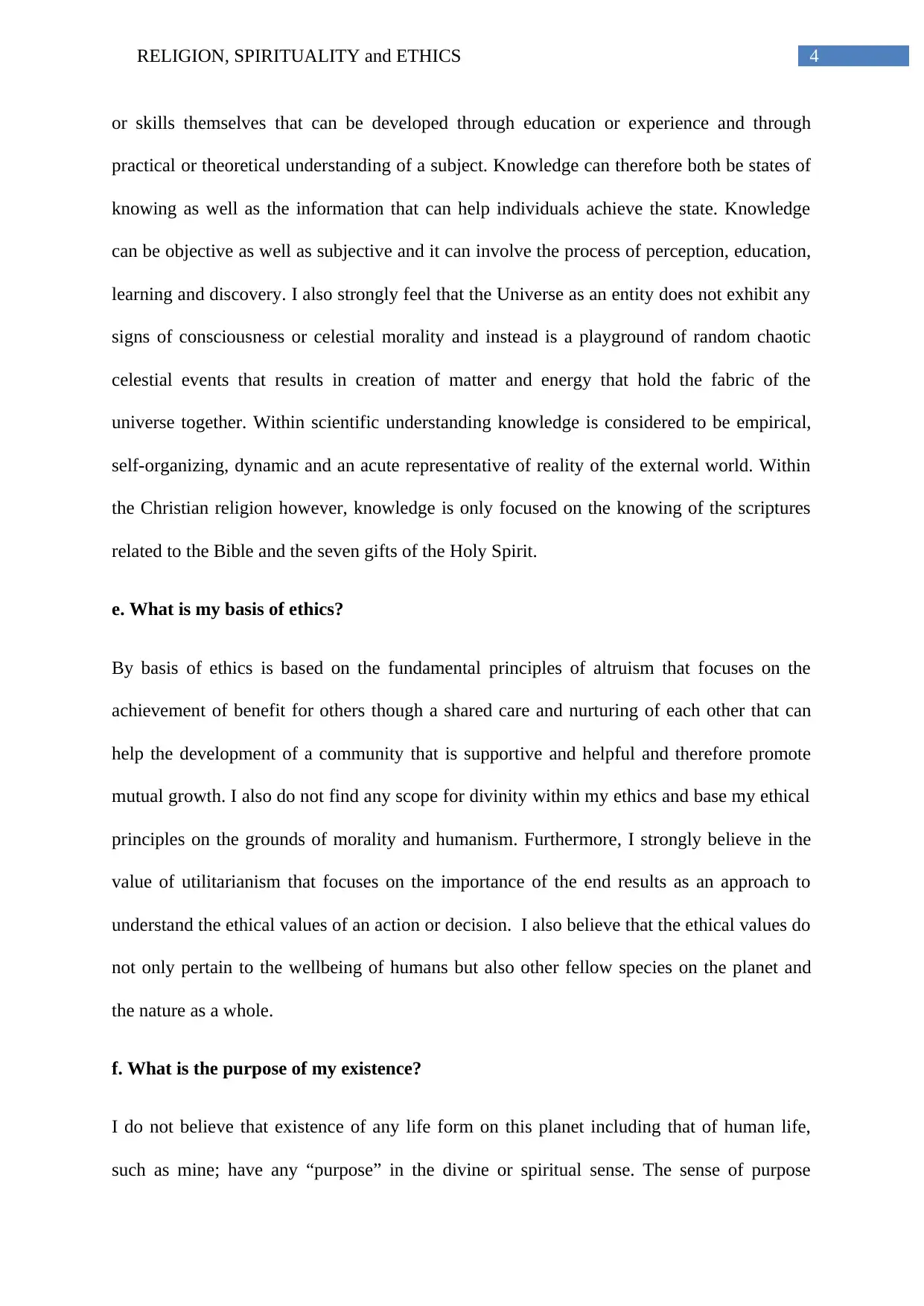
4RELIGION, SPIRITUALITY and ETHICS
or skills themselves that can be developed through education or experience and through
practical or theoretical understanding of a subject. Knowledge can therefore both be states of
knowing as well as the information that can help individuals achieve the state. Knowledge
can be objective as well as subjective and it can involve the process of perception, education,
learning and discovery. I also strongly feel that the Universe as an entity does not exhibit any
signs of consciousness or celestial morality and instead is a playground of random chaotic
celestial events that results in creation of matter and energy that hold the fabric of the
universe together. Within scientific understanding knowledge is considered to be empirical,
self-organizing, dynamic and an acute representative of reality of the external world. Within
the Christian religion however, knowledge is only focused on the knowing of the scriptures
related to the Bible and the seven gifts of the Holy Spirit.
e. What is my basis of ethics?
By basis of ethics is based on the fundamental principles of altruism that focuses on the
achievement of benefit for others though a shared care and nurturing of each other that can
help the development of a community that is supportive and helpful and therefore promote
mutual growth. I also do not find any scope for divinity within my ethics and base my ethical
principles on the grounds of morality and humanism. Furthermore, I strongly believe in the
value of utilitarianism that focuses on the importance of the end results as an approach to
understand the ethical values of an action or decision. I also believe that the ethical values do
not only pertain to the wellbeing of humans but also other fellow species on the planet and
the nature as a whole.
f. What is the purpose of my existence?
I do not believe that existence of any life form on this planet including that of human life,
such as mine; have any “purpose” in the divine or spiritual sense. The sense of purpose
or skills themselves that can be developed through education or experience and through
practical or theoretical understanding of a subject. Knowledge can therefore both be states of
knowing as well as the information that can help individuals achieve the state. Knowledge
can be objective as well as subjective and it can involve the process of perception, education,
learning and discovery. I also strongly feel that the Universe as an entity does not exhibit any
signs of consciousness or celestial morality and instead is a playground of random chaotic
celestial events that results in creation of matter and energy that hold the fabric of the
universe together. Within scientific understanding knowledge is considered to be empirical,
self-organizing, dynamic and an acute representative of reality of the external world. Within
the Christian religion however, knowledge is only focused on the knowing of the scriptures
related to the Bible and the seven gifts of the Holy Spirit.
e. What is my basis of ethics?
By basis of ethics is based on the fundamental principles of altruism that focuses on the
achievement of benefit for others though a shared care and nurturing of each other that can
help the development of a community that is supportive and helpful and therefore promote
mutual growth. I also do not find any scope for divinity within my ethics and base my ethical
principles on the grounds of morality and humanism. Furthermore, I strongly believe in the
value of utilitarianism that focuses on the importance of the end results as an approach to
understand the ethical values of an action or decision. I also believe that the ethical values do
not only pertain to the wellbeing of humans but also other fellow species on the planet and
the nature as a whole.
f. What is the purpose of my existence?
I do not believe that existence of any life form on this planet including that of human life,
such as mine; have any “purpose” in the divine or spiritual sense. The sense of purpose
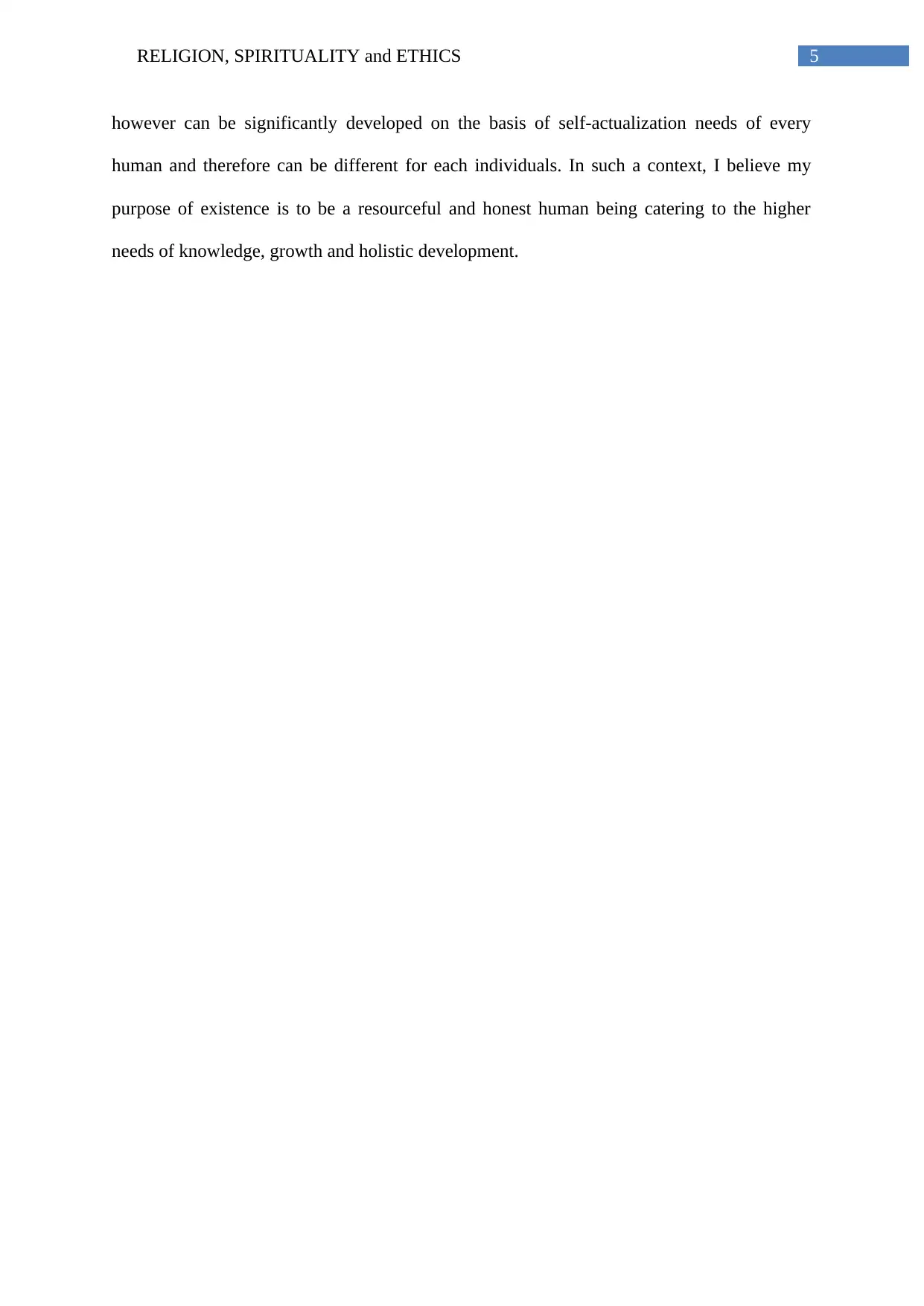
5RELIGION, SPIRITUALITY and ETHICS
however can be significantly developed on the basis of self-actualization needs of every
human and therefore can be different for each individuals. In such a context, I believe my
purpose of existence is to be a resourceful and honest human being catering to the higher
needs of knowledge, growth and holistic development.
however can be significantly developed on the basis of self-actualization needs of every
human and therefore can be different for each individuals. In such a context, I believe my
purpose of existence is to be a resourceful and honest human being catering to the higher
needs of knowledge, growth and holistic development.
⊘ This is a preview!⊘
Do you want full access?
Subscribe today to unlock all pages.

Trusted by 1+ million students worldwide
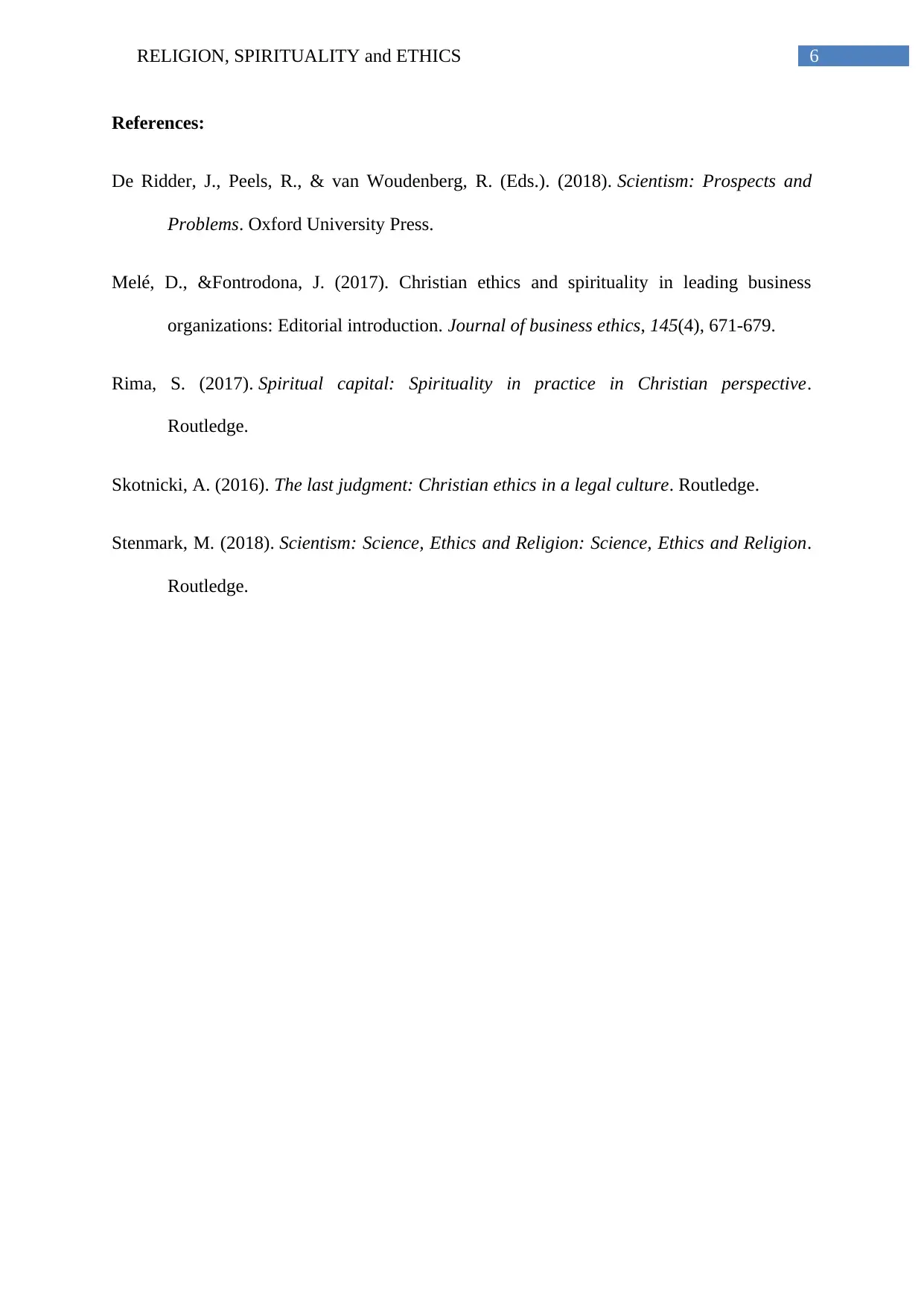
6RELIGION, SPIRITUALITY and ETHICS
References:
De Ridder, J., Peels, R., & van Woudenberg, R. (Eds.). (2018). Scientism: Prospects and
Problems. Oxford University Press.
Melé, D., &Fontrodona, J. (2017). Christian ethics and spirituality in leading business
organizations: Editorial introduction. Journal of business ethics, 145(4), 671-679.
Rima, S. (2017). Spiritual capital: Spirituality in practice in Christian perspective.
Routledge.
Skotnicki, A. (2016). The last judgment: Christian ethics in a legal culture. Routledge.
Stenmark, M. (2018). Scientism: Science, Ethics and Religion: Science, Ethics and Religion.
Routledge.
References:
De Ridder, J., Peels, R., & van Woudenberg, R. (Eds.). (2018). Scientism: Prospects and
Problems. Oxford University Press.
Melé, D., &Fontrodona, J. (2017). Christian ethics and spirituality in leading business
organizations: Editorial introduction. Journal of business ethics, 145(4), 671-679.
Rima, S. (2017). Spiritual capital: Spirituality in practice in Christian perspective.
Routledge.
Skotnicki, A. (2016). The last judgment: Christian ethics in a legal culture. Routledge.
Stenmark, M. (2018). Scientism: Science, Ethics and Religion: Science, Ethics and Religion.
Routledge.
1 out of 7
Related Documents
Your All-in-One AI-Powered Toolkit for Academic Success.
+13062052269
info@desklib.com
Available 24*7 on WhatsApp / Email
![[object Object]](/_next/static/media/star-bottom.7253800d.svg)
Unlock your academic potential
Copyright © 2020–2026 A2Z Services. All Rights Reserved. Developed and managed by ZUCOL.




